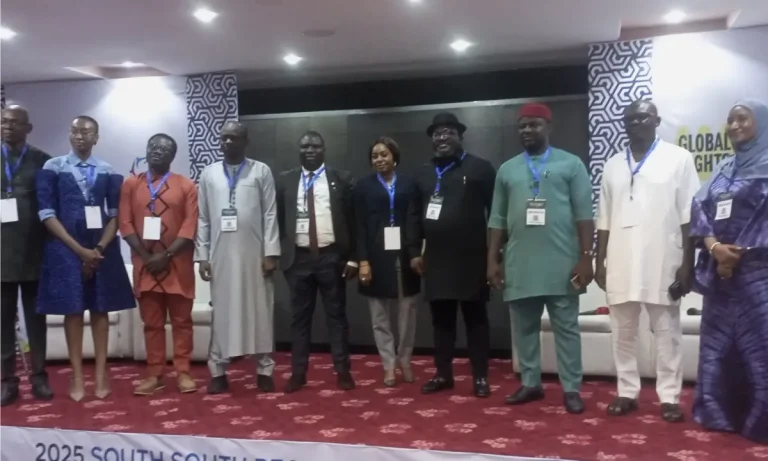Legislative reforms that would eliminate all regulatory barriers and enhance the effective functioning of Civil Society Organizations (CSOs) in Nigeria have been demanded by government actors and civic space stakeholders.
During the 2025 South South Regional Conference on Improving Regulatory Environment for CSO operations in Nigeria, which was hosted by Global Rights with assistance from the European Union Delegation to Nigeria and West Africa, the stakeholders made the call in the capital of Uyo, Akwa Ibom State.
“Scaling Policy to Action-Strengthening the Regulatory Environment for Sustainable CSO Operations at the Sub-national Level” is the conference’s theme for 2025.
Dr. Ini Adiakpanin, the former commissioner for women’s affairs and social welfare in Akwa Ibom, noted that CSOs had voiced their displeasure with the numerous registration requirements with government organizations and the resulting cost burden.
She advocated for a single registration that would encompass all aspects of the government.
Given the lack of money for the majority of CSOs and the humanitarian nature of their services, Adiakpan added that laws and policies should be amended to allow CSOs in each state to pay a set sum for registrations.
She said, ”CSOs complain about multiplicity of registration with government, some with women affairs, the other one would be youth development even environment. The issue had been, why don’t we have like a one stop shop where we register once so that from one registration you can use it to deal with everything about government? Not paying in different places.”
The Keynote speaker, KufreAbasi Edidem, in his address explained that before initiating reforms, there must be holistic review of the existing laws and regulations affecting CSOs, which according to him includes, understanding their objectives, there applicability, and areas needing revision.
Edidem who is the Deputy Speaker of Akwa Ibom State House Assembly further explained that experts such as lawyers , journalists, policy analyst should be engaged in the process while data driven and well articulated report is presented to both legislative and executive stakeholders.
He encouraged the CSOs to embark on a wider consultations with the Senate, House of Representatives, State Houses of Assembly as well as Law Reform Commission stressing that the commission is mandated to review outdated laws and advise government accordingly as only after proper consultations can the legislature be guided on which law to amend or repel.
He admitted that while the state houses of Assembly play a role especially in oversight the primary responsibility lies with the National Assembly because many of the laws regulating CSOs especially the Company and Allied Matter Act 2020 CAMA falls under the exclusive legislative list and once the National Assembly legislates on a subject, the state legislature cannot enact conflicting laws except in areas not covered.
”It is also important for CSOs to understand legal exceptions that already exist for example, section 10(f) of the tenement rate law cap 151 law of Akwa Ibom State, 2000 exempts non profit organisations from paying tenement rate, section 3 of the business premises registration law cap 124 also empowers the commissioner to grant exemptions to CSOs, similar provisions exist at the federal level under CAMA and VAT act.” He added.
However, he pledged to use the pertinent legislative tools at his disposal to guarantee that laws are passed that would allow CSOs in Akwa Ibom State and the South South region as a whole to operate effectively.
Abiodun Baiyewu, the executive director of Global Rights, had earlier in her speech outlined the organization’s noteworthy advancements in the year following the 2024 regional conferences, particularly in the area of cooperation for a sustainable operating environment for CSOs.
Baiyewu added that he hoped the 2025 conferences will produce concrete measures that would enable civil society actors to maximize their influence and freely carry out their humanitarian work in communities.
In order to reduce redundant registrations, improve funding opportunities, and promote inclusive policy development, this year’s conferences aim to carry on the discussion from the previous year and consolidate the implementation of a harmonized regulatory framework, either through the passage of a policy or law.
According to Baiyewu, the 2025 conferences will also create a regional task force for cooperation and provide the CSO community with instruments that should enhance CSO compliance with current legislation.
Regarding the significance of the conference, the European Union Delegation to Nigeria and ECOWAS stated that its goal was to improve the cooperation and frequent communication between CSOs and State government organizations in order to create a regulatory environment that is conducive to their operations.
“These conferences are intended to serve as forums for state and federal government actors as well as civil society stakeholders to convene, debate, and reach consensus on important matters concerning laws and regulations that impact civil society operations.” “I said,” she said.





